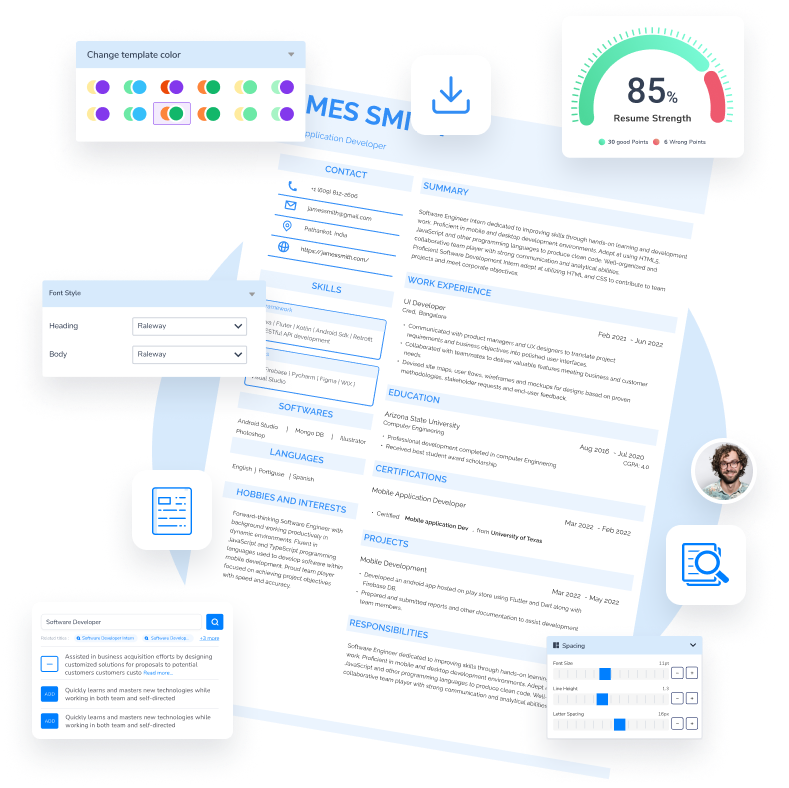Crafting the Perfect Resume: Essential and Optional Elements Explained
4-5 mins read

All job searchers must create a resume that is appealing in the current job market. In addition to highlighting your qualifications, a well-structured resume conveys your potential value to potential employers. This blog will examine a resume's necessary and optional components, offering guidance to assist you in creating the ideal document to land your perfect position.
Key Components of a Resume
- Contact Details
A contact list that is easy to find and understand should be at the top of your resume. This includes:
- Full Name: Use a large format to make this stand out.
- Phone Number: Provide a number where people may easily reach you.
- Try using a business-oriented email address. You should also refrain from using any unprofessional aliases or nicknames.
- Location: The city and state where you reside are sufficient so you can omit your full address for privacy purposes.
- Objective or Summary Statement
An objective or summary statement offers concise information on your career goals and qualifications. It should be brief, educational, and specific to the position for which you are seeking. For instance:
- Goal: "I am looking for a marketing position where I can apply my digital marketing and project management skills."
- "Results-oriented marketing professional with over five years of experience in creating successful online campaigns," is the summary.
Experience in the Workplace
This area is essential since it will provide an overview of your work history. In reverse chronological sequence, you should enumerate the following experiences:
- Title of the job
- Name of the company
- Location
- Dates of employment
- Responsibilities and achievements: You should use bullet points to describe your duties and accomplishments starting each with a strong verb like ‘managed’, ‘developed’, or ‘implemented’.
Education
Your educational background must follow your work experiences providing information on:
- The degree that you have pursued
- Name of institution
- Date of passing out or graduation
- Relevant coursework or honor: It is the most important aspect for recent graduates or those having limited work experience.
Skills
Try to emphasize the hard and soft abilities pertinent to your position. Technical expertise (e.g., software knowledge) and interpersonal skills (e.g., communication, teamwork) can be included. Thus, classifying your abilities can improve readability.
Optional Components to Strengthen Your CV

Certifications
Try to add any qualifications that are pertinent to your work, such as software proficiency or project management, if at all possible. This can help you stand out from the competition.
Volunteer Work
You should include volunteer experiences highlighting your commitment and transferable skills especially if you lack extensive work history.
Awards and Honors
Mentioning awards can increase your credibility. Try to mention the name of the award, the awarding body, and the dates received.
Professional Associations
If you have any memberships in relevant professional organizations enlist them with your education in the field.
Hobbies and Interests
It is not mandatory but you can include hobbies that may give employers insights into your personality and cultural fit within their team.
Tailoring Your Resume
One of the most crucial aspects of writing your resume is customization. Every job application should prompt a review of your resume to ensure that it aligns with the requirements given in the description of the job. Additionally, you can also use keywords from job postings to enhance compatibility with the applicant tracking system (ATS).
Formatting Tips
A well-formatted resume is easy to read and more appealing visually:
- Length: Aim for one page if you have less than ten years of experience as two pages are mostly acceptable for more extensive careers.
- Font Choice: Use professional fonts like Calbri in 10-12 for body texts.
- Margins: Standard one-inch margins are recommended but try to adjust them for fitting content without overcrowding.
- Bullet Points: Additionally, you must use bullet points for clarity making it easy for hiring managers to scan through qualifications quickly.
Final Takeaways
Before submitting your resume to the employers:
- Proofread: Always check for spelling and grammatical errors. You can also ask someone else to review it.
- High-quality Paper: If you are submitting a physical copy use high-quality paper for printing.
Therefore, platforms like Hyresnap offer resources that provide templates and tips tailored to different industries for those looking to simplify the resume creation process. By using these tools, you can save time while ensuring that your resume meets industry standards.
Conclusion
Creating the perfect resume involves understanding essential and optional elements that effectively highlight your qualifications. By customizing the application, adhering to best formatting practices, and using resources like Hyresnap you can generate a compelling resume that captures the attention of hiring managers and employers as a strong candidate in any job market. Hence, remember that your resume is often the first impression you make so make it count!

Try Now for Free!

